Program Overview
The Global Leaders Program (GLP) of the Faculty of Economics at Hitotsubashi University aims to cultivate future leaders in areas such as business, public policy and academia for an ever-globalizing world. Our goal is to provide students with the necessary expertise in economics and related fields, cultivate a broader view of social processes and an ability to accurately assess real-world situations, promote critical thinking and creative problem-solving skills, and last but not least help students acquire fluent communication skills in both Japanese and English.
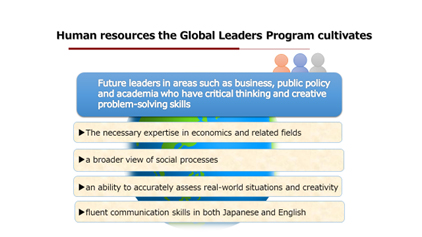
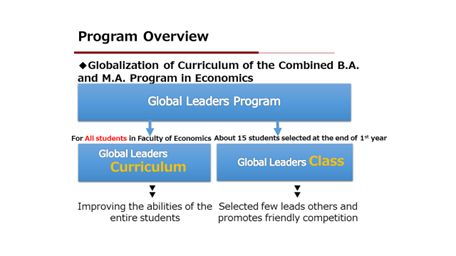
Curriculum
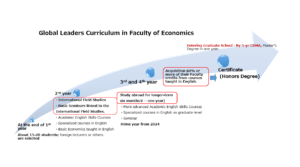
Attractive feature of the Global Leaders Program curriculum
①Academic English Skills Courses taught by native English-speaking professors.
②Courses in basic economics can be taken in both Japanese and English.
③Highly interactive small-group classes in English.
④International field studies set in Asia and Europe.
⑤Opportunities for long-term (six-months – one year) studies abroad at leading overseas universities.
⑥Undergraduate students can enroll in graduate-level Academic English courses.
⑦60% or more of the required course credits can be obtained from courses taught in English.
International Field Studies
One of the highlights of GLP that appeals to many students is our short-term overseas field research program, which focuses on developing countries in Asia as well as various countries within the EU. This is a hands-on project designed to help fulfill our overall program goal of producing capable future leaders who can promote full awareness of important regional and cultural differences in the global economy and effectively communicate with people around the world.
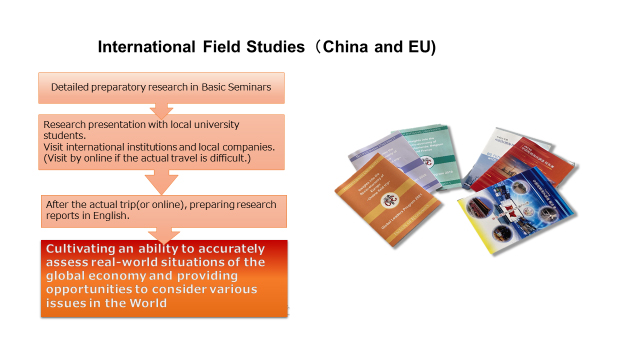
Our short-term international field studies require enrollment in two specially designated classes (“International Field Studies” and “Seminar”), conducted with the expert assistance of our GLP lecturers and coordinators. The students do their required preparatory work in the spring and summer quarters (April-July), participate in the actual field trip during the summer vacation/winter intersession and then, over the course of the fall and winter quarters (October-January), work on an English-language report summarizing their activities.
Reports on Field Studies
(The latest three years of the reports are linked. Please contact Global Office for older ones.)
Academic Year 2024-2025
Insights into the Socio-Economy of Germany and [PDF:27.8MB]
2024China Field Studies (full text in Japanese and [PDF:8.9MB]
Academic Year 2023-2024
Insights into the Socio-Economy of Germany and [PDF:32.9MB]
2023China Field Studies (full text in Japanese and [PDF:6.3MB]
Academic Year 2022-2023
Insights into the Socio-economy of Europe ~Online field trip~ [PDF: 6.56MB]
2022 China Field Studies (full text in Japanese and English) [PDF:6.54MB]
Study Abroad
In today’s global world, it is important to be able to efficiently exchange views, work collaboratively and engage in consensus building with people from diverse cultural backgrounds. Studying abroad is the most effective way to develop such skills and capabilities required for a global leader.
Hitotsubashi University Study Abroad Scholarship (information available in Japanese)
The Global Leaders Class students at the Faculty of Economics and the Shibusawa Scholar students at the Faculty of Commerce and Management are given priority over other applicants in being nominated as exchange students at our partner institutions with which we have Faculty agreements. (As for the university marked with an asterisk, only the Global Leaders Class students at the Faculty of Economics will be given priority.)
Faculty Student Exchange Agreements with:
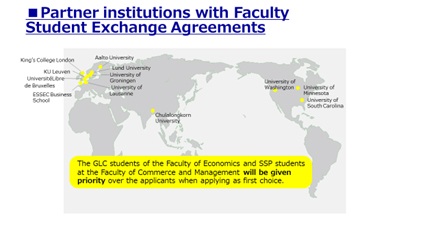 Faculty of Commerce and Accountancy, Chulalongkorn University
Faculty of Commerce and Accountancy, Chulalongkorn University
Carlson School of Management, University of Minnesota
Darla Moore School of Business, University of South Carolina
Department of Economics, University of Washington*
School of Management and Business, King’s College London
Faculty of Economics and Business, KU Leuven
Solvay Brussels School of Economics and Management, UniversitéLibre de Bruxelles
School of Business, Aalto University
ESSEC Business School
Faculty of Economics and Business, University of Groningen
School of Economics and Management, Lund University
Faculty of Business and Economics (HEC), University of Lausanne

